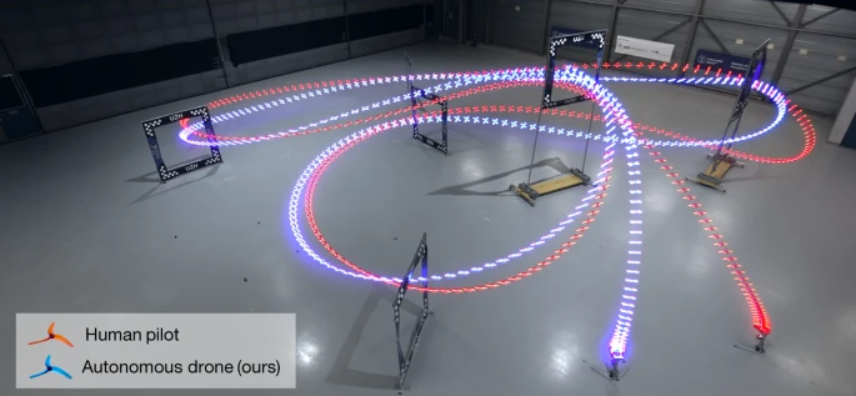 AI
AI
 AI
AI
 AI
AI
In what is being called a world first and another giant leap for artificial intelligence, an autonomous drone in Switzerland just outperformed the world’s best drone racers more than 25 separate races.
The competition pitted the human champions in what were first-person view, or FPV, races in which the humans pilot high-speed aircraft through a course of obstacles using a headset connected to a camera on their drones. Up until now, the human champs have not been beaten by any AI. The AI won 15 out of 25 races and recorded the fastest lap time. The victory is being compared to AI beating humans at chess and Google’s DeepMind victory in the game “Go.”
Researchers at the University of Zurich trained the drone, “Swift,” using something called deep reinforcement learning to find the optimal route around what is a tricky circuit with various gates to travel through.
In practice, in which Swift was trained on a simulation of the course, the drone crashed many times, but it soon got a handle on things. As the drone race up to speeds of 50 mph, its single camera sends information back to a neural network that then detects the gates it has to fly through. The drone’s inertial sensor picks up information on speed, position and orientation, and that information is sent back to a second neural network that tells the drone what it has to do.
The upshot was Swift consistently beat the human champs in all areas, making tighter turns at higher speeds. It wasn’t invincible, though. It crashed a few times and didn’t always win the races. The researchers said Swift was sensitive to the environment, such as any changes to how much light there was.
“The possibilities are endless; this is the start of something that could change the whole world,” one of the champs who was beaten said. The researchers said something similar in their paper in Nature, explaining that this should “inspire the deployment of hybrid learning-based solutions in other physical systems, such as autonomous ground vehicles, aircraft, and personal robots, across a broad range of applications.”
No doubt the militaries of the world will have taken note.
Support our mission to keep content open and free by engaging with theCUBE community. Join theCUBE’s Alumni Trust Network, where technology leaders connect, share intelligence and create opportunities.
Founded by tech visionaries John Furrier and Dave Vellante, SiliconANGLE Media has built a dynamic ecosystem of industry-leading digital media brands that reach 15+ million elite tech professionals. Our new proprietary theCUBE AI Video Cloud is breaking ground in audience interaction, leveraging theCUBEai.com neural network to help technology companies make data-driven decisions and stay at the forefront of industry conversations.